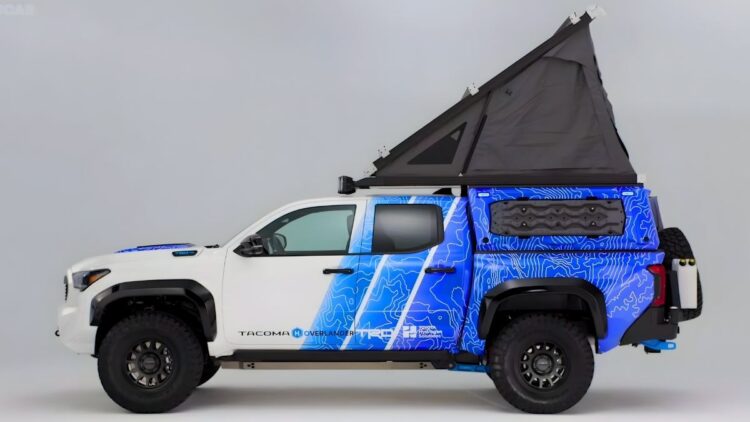Toyota unveiled the Tacoma H-2 Overlander, a hydrogen fuel cell concept truck, at SEMA 2025. The model is just a showcase of Toyota’s hydrogen fuel-cell technology. Know more about the Toyota Tacoma H2-Overlander from here.
Toyota has been developing hydrogen fuel cell technology for over a decade and has launched its first mass-produced fuel cell electric vehicles, such as the Toyota Mirai. The Toyota Tacoma is a popular mid-size pickup truck, and its hydrogen fuel cell version is showcased at SEMA 2025.
The vehicle offers sustainable solutions, offering greener carbon footprints. Toyota kept the theme of TRD off-road heritage and developed the cutting-edge, powerful vehicle with the Tacoma H2-Overlander concept.
Toyota Tacoma H2-Overlander Concept
Toyota displayed the Tacoma H2-Overlander concept vehicle at the Las Vegas Convention Center during the SEMA Show 2025. SEMA show 2025 has started on 04 November till 07 November 2025. The Tacoma H-2 Overlander concept was engineered and built by Toyota Racing Development.
Toyota Racing Development is the same team that developed and works on NASCAR engines built on the TNGA-F platform. This is the same body-on-frame architecture used in Tacomas. The H2-Overlander showcased the TRD team’s ability beyond the racing track.
The truck is designed for off-grid independence and shows how hydrogen can power the eco-friendly vehicles. The hydrogen and oxygen combine, creating a chemical reaction and producing water vapor and electricity.
Toyota Tacoma H2- Overlander Features
Toyota H2-Overlander is a one-of-a-kind vehicle with lots of amazing and different features, such as:
- One of the highlights of the Toyota Tacoma Hydrogen concept vehicle is the RD exhaust water recovery system. The water filtration system includes the water purification system that will never let you die of thirst, as you can filter water from rivers or lakes.
- The Overlander can charge other EVs or gear in remote areas, allowing you to have your own charging system in emergencies.
- The vehicle is built to operate in remote areas without needing outside sources, electricity, fuel stations, or water, allowing you to explore places without worrying about the general things.
- The Overlander has recycled carbon fiber aero panels in the exterior, offering environmental solutions.
- The vehicle has an integrated Mirai fuel-cell stack and three hydrogen tanks of capacity 6kg. The concept has a TRD custom cooling system, Lexus RZ components adapted from Tacoma, and thermal stability for hydrogen and electric systems.
Toyota Tacoma H2-Overlander Performance & Specs
Toyota did not release much about the Tacoma H2-Overlander performance and specifications; however, here are a few things that have been made public:
- Battery Pack: The model has a 24.9 kWh lithium-ion battery pack, which is a moderate-sized battery pack. The battery pack will work alongside the hydrogen fuel cell in the H2-Overlander to power the electric motors.
- Powertrain: The electric motors can produce 302 hp (front motor), 252 hp (rear axle), and the combined output is 547 hp. It will have a 15-kW power takeoff system charging ECs and can power a home off-grid.
- Wheels & brakes: The truck will have Tundra front brake upgrades and custom 17×8.5-inch wheels and 35 x 12.5 R-17 off-road tires.
- Suspension: The TRD billet long-travel kit has the Fox 2.5 Performance Elite Series Shock, enhancing the suspension and offering the driver stability and control while traveling on off-road.
- Platform and Build: The Tacoma H2-Overlander is built on the TNGA-F architecture and is equipped with TRD accessories, such as recovery board storage, roof rack with lightning, suspension upgrades, and recycled carbon fiber body panels.
Will it be available in the future?
As of now, Toyota has presented this innovation as a concept vehicle to showcase that hydrogen-fuel cell technology can deliver a highly performing vehicle with many other sustainable features.
The company has presented its vision of a carbon-neutral future and the possibility of zero emissions. It is the concept vehicle, and the company has not announced any production plan for this vehicle yet. Since there is no official confirmation, the pricing, release, and other possibilities will be just speculations.
The concept can be used in future trucks or commercial vehicles, to build next-gen vehicles on hydrogen fuel cell technology, and to explore the future possibilities of this concept for actual use that will align with environmental goals.





